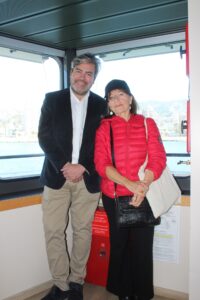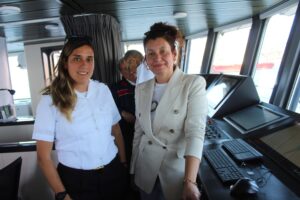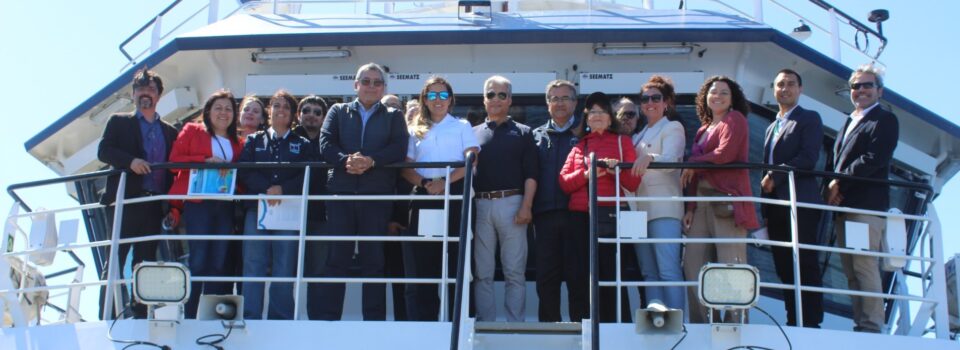Fisheries Research in Action: The visit to the Dra. Barbieri B/C and its impact on the sustainable management of the yellow shrimp, red shrimp and nylon shrimp fishery resources
November 22nd, 2024 On Friday, November 15, 2024, authorities and professionals from the Fisheries Development Institute (IFOP), the Undersecretariat of Fisheries and Aquaculture (SSPA), the Ministry of Economy and the Ministry of the Environment participated in a visit to the Dra. Barbieri B/C. During the activity, which also included the presence of Dr. María Ángela Barbieri, the preliminary results of the project “Direct evaluation of yellow shrimp, red shrimp and nylon shrimp between the Atacama and Biobío regions, 2024” were presented, led by researcher Carolina Lang of the IFOP Direct Evaluations Department.
On Friday, November 15, 2024, authorities and professionals from the Fisheries Development Institute (IFOP), the Undersecretariat of Fisheries and Aquaculture (SSPA), the Ministry of Economy and the Ministry of the Environment participated in a visit to the Dra. Barbieri B/C. During the activity, which also included the presence of Dr. María Ángela Barbieri, the preliminary results of the project “Direct evaluation of yellow shrimp, red shrimp and nylon shrimp between the Atacama and Biobío regions, 2024” were presented, led by researcher Carolina Lang of the IFOP Direct Evaluations Department.
The attendees toured the vessel, learning about its advanced technological capabilities. Equipped with laboratories, monitoring equipment and advanced fishing and navigation systems, the Dra. Barbieri demonstrated its ability to collect critical data on the abundance and distribution of target species. “Each onboard campaign not only contributes to assessing the status of the stocks, but also expands our knowledge of marine biodiversity and ecosystems, which in the case of demersal crustaceans, up to 18 different species have been recorded in one fishing haul, including invertebrates, fish and chondrichthyans,” said the professional in charge of the research.
The dissemination activity focused on publicizing the capabilities of the B/C Dra. Barbieri and the scope of the demersal crustacean project. At the event, Dr. (c) Carolina Lang highlighted that the project is not only limited to the traditional objectives of direct assessment, which is to provide relative abundance indices to support decision-making, but that the collaboration with the Sustainable Productive Development Program (DPS) frames this research within the UN Sustainable Development Goals (SDG), contributing to food security and sovereignty and adaptation to climate change.
 Another highlight was the visibility of the role of women in key positions, such as leading projects, piloting cruise ships and taking charge of sampling on board, roles historically dominated by men. “This approach reflects significant progress in reducing gender gaps, consolidating IFOP as a benchmark in inclusion and promotion of equality. This inspires future generations of female researchers to actively integrate into science and overcome historical barriers. With these efforts, IFOP not only reinforces its scientific mission, but also leads a transformative cultural change in the relationship between science and gender,” Carolina highlighted.
Another highlight was the visibility of the role of women in key positions, such as leading projects, piloting cruise ships and taking charge of sampling on board, roles historically dominated by men. “This approach reflects significant progress in reducing gender gaps, consolidating IFOP as a benchmark in inclusion and promotion of equality. This inspires future generations of female researchers to actively integrate into science and overcome historical barriers. With these efforts, IFOP not only reinforces its scientific mission, but also leads a transformative cultural change in the relationship between science and gender,” Carolina highlighted.
The activity not only highlighted the scientific relevance of the cruise, but also the human dimension behind its execution. Attendees had the opportunity to interact with the crew and leaders of the cruise, delving into the impact of the project on applied science and the strengthening of inter-institutional networks. The interactions helped to clarify the role of each organization involved and to highlight the importance of the articulation between them. In this regard, Gonzalo Pereira, Executive Director of IFOP, emphasized the value of these instances, stating: “They are an opportunity to make our work known and, at the same time, to reflect on the challenges that IFOP faces, especially in terms of funding. These challenges put the continuity of research at risk, precisely at a critical moment when threats derived from climate change demand more research. It is essential to understand and anticipate how these changes will affect the availability and sustainability of fishery resources, as well as the social dimension and the communities that depend on them.”
Reactions from the authorities
From the Undersecretariat of Fisheries and Aquaculture, represented by Marcos Troncoso (Manager, Crustaceans Unit, Fisheries Administration Division), Guisella Muñoz (Professional, Crustaceans Unit, Fisheries Administration Division) and Marta Hernández (Head of the Administrative Department), they explain that it is relevant to highlight that all the applied science carried out by the direct evaluation cruises executed by the IFOP are a vitally important piece in the decision-making process, in the management procedures established in different fisheries, and therefore in the fisheries management carried out by our institution. Also noteworthy is the quality and characteristics of the B/C Dra. Barbieri, as a new research platform that has impeccable facilities to meet the requirements that this institution needs to contribute to the conservation and sustainable use of resources. The strategic alliance between IFOP and DPS is an example to incorporate other State institutions that come together in the search for sustainable management of our fisheries with the best available information, allowing us to meet other objectives of interest both for this Undersecretariat and for the State of Chile, including food security; adaptation to climate change; gender equity and the fundamental role of women in research. Finally, we thank the Institute for the invitation to this important activity that made us aware of the work carried out by IFOP colleagues and the crew of the B/C Dra. Barbieri.
Marcelo Arredondo, Seremi of Economy, Development and Tourism, said: “On the scientific vessel Dra. Barbieri, we have witnessed the results of inaugural campaigns carried out on red shrimp, yellow shrimp and nylon shrimp, highlighting how these applied investigations are allowing us to obtain products corresponding to catch quotas based on fundamental knowledge that will allow the proper protection of these resources, in harmony with food security, productive and economic development of the sector, and in tune with the needs of adaptation to climate change.
From our ministry, and specifically through the Sustainable Productive Development Program, we are happy to support initiatives such as these from the IFOP, because they are highlighting the importance of scientific knowledge in decision-making for careful fishery management in the face of climatic, social, food and environmental challenges. Also noteworthy is the work of a team that considers gender equity relevant, starting with the ship’s crew. There is no doubt that this second IFOP operating unit, equipped with cutting-edge technology, will position the country with high quality standards in the fisheries science that we carry out. This is a joint effort that is producing high public value, based on a complex chain so that Dr. Barbieri can carry out her research operations in the ocean, throughout the country.
Víctor Caro Castro, Head of the Environmental Information and Economics Division of the Ministry of the Environment added “A development strategy based on sustainability requires sustainable production systems and for this, robust information based on science is key, for this reason the research work carried out by the IFOP is essential to outline strategies and good practices for food security and sovereignty. From the MMA, we recognize the importance of the DPS supporting this type of initiatives.”
